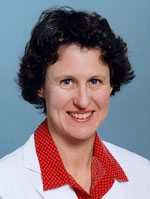Researchers at Washington University in St. Louis are seeking volunteers between the ages of 55 and 75 to learn how physical and mental exercises influence brain function and performance of daily activities.
The three-year study is seeking nearly 100 mostly sedentary nonsmokers who are free of cognitive impairments or dementia. Investigators hope to learn whether brain and body training can improve quality of life.
“We’re training older adults in tasks that should help them with daily activities,” says principal investigator Ellen F. Binder, MD. “The cognitive training will focus on memory, attention and sequencing and coordinating tasks. The physical and mental exercises are designed to help people improve performance of daily activities like preparing a meal, taking medications, keeping appointments and remembering other important information.”

For the exercise-training component of the study, researchers will compare aerobic exercise on treadmills or exercise bikes with flexibility training. In the cognitive portion of the study, a specialized brain-training regimen will be compared with a more general health-education program.
Participants will be randomly divided into four groups. One group will do aerobic exercise and receive cognitive training. A second group will do aerobic exercise along with a standard, health-education program. A third group will do home stretching and flexibility exercises combined with cognitive training. The final group will do in-home flexibility training with the health-education program.
“We want to learn whether aerobic exercise, which can increase blood flow and the amount of oxygen delivered to the brain, might induce changes in brain function or make the brain act differently than the lower-intensity flexibility program,” says Binder, associate professor of medicine in the Division of Geriatrics and Nutritional Science. “We also know that cognitive training can stimulate the brain, so we’re looking to see what level of training might be necessary to translate into better performance in daily activities.”
Medical conditions do not necessarily eliminate eligibility for the study. People with diabetes can participate, provided they take oral medication rather than insulin to control blood sugar. Those taking medications for heart disease, high blood pressure and other conditions are eligible as long as their condition is considered stable.
The aerobic exercise group will work with a trainer at the St. Louis Jewish Community Center. All study subjects will be seen at Washington University School of Medicine for two screening visits. At various times during the study, volunteers also will participate in interviews as well as memory, fitness and cognitive tests. Because of regular testing at the School of Medicine and regular exercise training at the Jewish Community Center, study participants must reside in the greater St. Louis area.
The study is free, including medical exams, tests, evaluations and exercise programs and cognitive training.
For more information, call Volunteer for Health at (314) 362-1000 or visit vfh.wustl.edu.
Washington University School of Medicine’s 2,100 employed and volunteer faculty physicians also are the medical staff of Barnes-Jewish and St. Louis Children’s hospitals. The School of Medicine is one of the leading medical research, teaching and patient care institutions in the nation, currently ranked fourth in the nation by U.S. News & World Report. Through its affiliations with Barnes-Jewish and St. Louis Children’s hospitals, the School of Medicine is linked to BJC HealthCare.